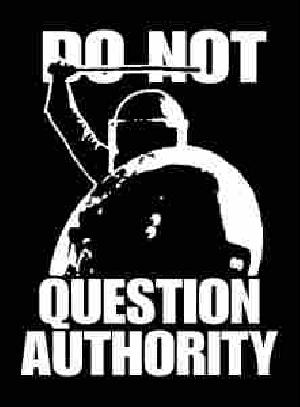I was visiting Zeeshan at GW a couple weeks ago, and we ended up visiting some of his friends at another dorm. Me and Zeeshan were a little tipsy at the time, and we did what any sensible anarchists would do in that situation: we started a heated political debate with a room full of centrists and conservatives. One of Zeeshan's friends - in response to my assertion that equality is an extremely important principle that is grossly neglected in our society - pointed out that there is a difference between equality and equity and questioned whether equality without equity was an ideal to be striven for. As I was nicely intoxicated at the time, I wasn't together enough to reply competently to such a sharp departure from the conventional mindless anti-socialism rhetoric. Now that I've sobered up, however, I feel like I can address Carn's comments.
It is true that equality itself is not necessarily the best state for society. I mean, it hardly seems desirable for everyone on earth to be in abject poverty, even if everyone was equally poor. Similarly, pure equality (equal work, equal pay) may seem like a good idea at first to some, but if you examine it closely, it starts to fall apart. Obviously different people have different needs, desires, strengths and weaknesses, so it doesn't make sense to treat everyone exactly the same. However, these are relatively minor problems, and they could easily be fixed with a little tweaking. Either way, I'm not here to argue the pros and cons of equality, I'm here to refute Carn's argument.
Carn asserted that equity is more important that equality, meaning that you should only get basic necessities if you "deserve" them. Now, it's hard to determine what he though someone needed to do to deserve food, clothes, and shelter (he never said it outright) but he's a Libertarian in the tradition of Ayn Rand, so I have some suspicions. He probably believes that the right to private property is more inalienable than the right to life (this is not bitter sarcasm or political slander, most Libertarians either implicitly or explicitly believe this) and that people who have a lot of property deserve more than people with little or no property. It also stands to reason that he believes that people with more merit deserve more than the less skilled people. The problem with this approach, however, is that merit is not a simple, one-dimensional quality. You can have many different skills in varying degrees, and there's no objective way to determine how much "merit" you have. If I'm much better at soccer than somebody else, does that mean I deserve to be better off than somebody who can't play? Or does merit only count with skills that are beneficial to other people. Well, let's test. Which is more beneficial to other people, banking or farming? I think most people would agree that producing food is more important in the scheme of things that moving around money. However, bankers make much more money than most farmers. Why?
In capitalist society, merit is less important than possession. If you own a factory that makes a certain product, you are considered more important than the people who work in that factory; you are actually allowed to make more money from the sale of the products than the people that actually make them. You don't even have to know how to make the product, much less be good at doing it. Merit is nonexistent. That is the main reason extreme inequality exist in this society and the rest of the world. Now this little theory of mine might not hold as much water as the other theory (namely that we live in a near-perfect meritocracy and there are only a select few people who are competent enough to contribute to society in a meaningful way and there is even a depressingly large section of society which appears to be so incompetent that it can't even contribute enough to get the basic necessities of life; I mean, it just holds together so well) but I'm sticking with it. But seriously, it is much more reasonable to assumed that in a system actually based on merit (i.e. where people are allowed to work as hard as they want on whatever they're good at, and are able to receive the fruits of the labor) there would be much less inequality. Assuming you live in a hospitable enough environment, almost everyone on earth is completely capable of supporting themselves indefinitely. A society in which people are prevented from attaining the things that they could have easily gotten completely on their own hardly seems equitable.
So it seems that the question is not whether equality is more or less important than equity, it’s whether there’s a difference between the two. And there doesn’t seem to be.

